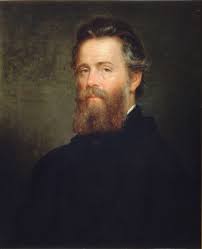About Herman Melville

Herman Melville, born in 1819 in New York City, is one of the most significant figures in American literature. His works are often concerned with the themes of existentialism, the individual's struggle against fate, and the natural world's overwhelming power.
Life and Early Career
Melville’s early years were shaped by a financial struggle after his father’s death. His travels aboard whaling ships in the 1840s became the inspiration for his most famous novel, *Moby-Dick*. He initially wrote adventure novels and travel stories, but his works often contained deeper philosophical and psychological themes.
Famous Works
- Moby-Dick – A tale of obsession, *Moby-Dick* tells the story of Captain Ahab’s relentless pursuit of the elusive white whale, exploring themes of fate, revenge, and the human soul.
- Billy Budd, Sailor – This novella examines the tragic fate of Billy Budd, a young, innocent sailor who is condemned for a crime he did not commit, raising questions of justice, morality, and fate.
- Bartleby, the Scrivener – A short story about a law clerk who withdraws from society, refusing to follow simple instructions. It is a profound reflection on alienation and personal autonomy.
- Typee – Based on Melville’s time among the Marquesan Islanders, *Typee* is an adventure story that critiques Western civilization through the lens of a naïve outsider’s experience.
Legacy and Influence
Melville's works, especially *Moby-Dick*, were not widely appreciated during his lifetime. However, they gained significant recognition in the 20th century, becoming essential texts in American literature. His exploration of the human psyche and his philosophical musings on life’s meaning have inspired generations of writers, including Ernest Hemingway, William Faulkner, and modernists like James Joyce.
Melville's Influence
*Moby-Dick* has been called the “Great American Novel.” Its deep philosophical questions, detailed descriptions, and psychological insight have influenced numerous authors and artists, cementing Melville’s place in the literary pantheon.